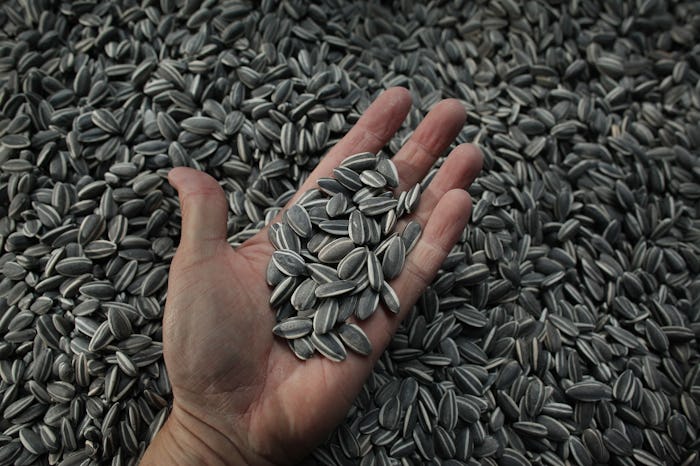
How Does Listeria Get Into Sunflower Seeds? It's Sort Of Complicated
The days of massive food recalls are nowhere near over. As more and more products are recalled due to possible listeria contamination, all I want to know is how does this happen? And how does listeria get into sunflower seeds in the first place? It's not clear from any manufacturer or agency how the bacteria has spread through various manufacturers recently. But it's not that hard to use your imagination for a minute.
Listeria is a bacteria that can be found in soil, water, and animals, like poultry and cattle. It's a wild bacteria in that it can spread into many "ready to eat" foods like deli meats, hot dogs, smoked seafood and store-prepared deli-salads, according to the Food and Drug Administration. The spread of the disease is easily prevented, but in large manufacturing centers, it can be hard to spot.
As for the recent recalls, there's no official word yet as to how the contamination spread. But since plants process many foods, it's hard to pinpoint where the contamination started. Sunflower seeds may have come in contact with something already contaminated. When it comes to frozen vegetables, it's possible that a listeria contamination happened before the veggies were frozen, hence that "voluntary recall" qualifier for many companies.
According to the FDA there are a few ways to ensure that listeria doesn't live on in your kitchen. They offer these tips:
- Keep your refrigerator at 40 degrees Fahrenheit or lower.
- Wrap foods always. And make sure other foods aren't leaking onto other foods.
- Use precooked and ready-to-eat foods as soon as you can after buying or preparing them.
When it comes to granola bars, like the recent Quaker recall, there's no way to freeze or get rid of a possible contamination as per the FDA guidelines except to know that they've been recalled and return the boxes or throw them that out. That's not satisfactory, but food manufacturing can be tricky like that.
Listeria bacteria can be killed over high heat, like cooking frozen veggies. But that it can somehow be preserved in cold temperatures is even more nerve-wracking. If you have food leftovers in your fridge that are over three days old, you should throw them out, according to Donald Zink, Ph.D, senior science advisor at the FDA's Center for Food Safety and Applied Nutrition. If you feel icky about bacteria, forget about what your grandma said and toss that pasta. If not, go for it. Just microwave them at least.
Although there isn't an official word yet about the facilities where certain ingredients in granola bars or Trader Joe's frozen rice meals could have come in contact with the bacteria, if you buy processed foods, outbreaks and possible contaminations like the recent listeria one are always possible. Different kinds of food are processed, cleaned, and distributed in many places. The most an American consumer can do is stay up to date on recalls. And heat everything up first.